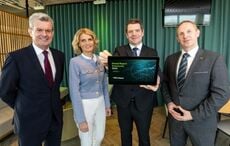IT will be a truly historic occasion next week when Northern Ireland's First Minister Dr. Ian Paisley and Deputy First Minster Martin McGuinness step out in America for the first time ever.
The symbolic importance of the two men going to the White House together on Friday, December 7 for a meeting with President George W. Bush will be enormous.
I can already see the American media gobbling this one up post-Thanksgiving. The story line is made for the quick 10-second sound bite that so much American news has become.
Former enemies now partners, they learned to work together, not to hate, etcetera. Cue the schmaltzy music and the leaders striding side by side into the Oval Office.
The fact that both men have wonderful back stories - Paisley the unrepentant Protestant preacher turned peacemaker, McGuinness, for so long in the shadow of the gunmen, now turned to peace -makes this story irresistible.
Of course, there is always the possibility that Paris or Britney might appear sans underwear somewhere to spoil the scoop, but let's face it, foreign policy good news is rare these days, which makes Northern Ireland an exception.
Given the fact that this week President Bush is engaged in efforts to restart the stalled Mideast process, the presence of McGuinness and Paisley together at the White House will provide a powerful example of how American intervention can work.
Former British Prime Minister Tony Blair, now a Middle East peace envoy, has made it clear that his Irish experiences have framed much of his approach to the Middle East quandary.
Perhaps top of the list is the reality that peace comes dropping slow, it takes years to negotiate and that the current on-off again approach to Middle East diplomacy simply cannot work.
Most of the heavy lifting on the North was done during the Clinton presidency, but we should not forget that Bush has appointed excellent special envoys to Ireland, including Richard Haass, Mitchell Reiss and the latest, Paula Dobriansky, all of whom were very senior in the State Department.
All three won the confidence of both sides in the peace process and spent many long hours helping negotiate through the many hurdles that cropped up before the power sharing government became a reality.
There have also been excellent ambassadorial appointments in Dublin, including the current incumbent, Thomas Foley, and his predecessor, James Kenny.
Speaking with a leading Northern Ireland journalist this week, he stated that one of the extraordinary aspects in the North is how the Democratic Unionist Party led by Paisley has now come to embrace America after being unrelentingly hostile for decades.
That is good politics for them. Belatedly they understand there could not have been a peace process that landed them in power without American intervention.
Now that they are in power they are even more aware of the reality of the need for economic investment from the U.S. to kick start the dormant economy in the North.
Last week at the Irish America magazine Business 100 awards luncheon, Dobriansky spoke about the major effort underway by the U.S. to ensure that the economic conference to be held in the North next May is be a major success. The conference will be a critical step in assessing whether or not there is real long-term interest in investing in Northern Ireland.
The facile comparison to the Celtic Tiger in the Irish Republic is frequently made, but the tiger truly took off at a particular moment in time when Ireland became a member of the European Union and was seen as an attractive way station for American companies that wanted to access that market.
Northern Ireland also has a troubled past and reputation that will be difficult to overcome. It has a highly skilled workforce and is English speaking which are major advantages, but it will still be a tough sell.
McGuinness and Paisley showing up in America together will certainly help, but it will merely be a first step on what is sure to be a hard slog. Bush's endorsement will be vital, but the success or otherwise of the economic conference will be the proof of the pudding.




Comments